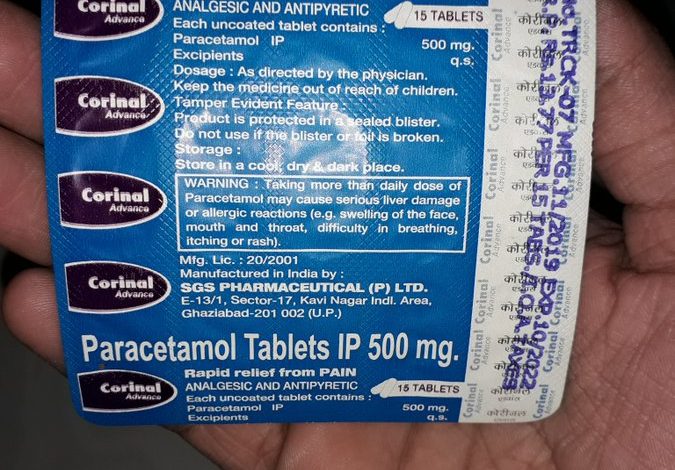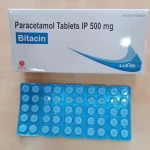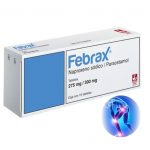Corinal Tablets 500mg: Uses, Benefits, Dosage, Side Effects, Interactions

Corinal Tablets is a brand of paracetamol (acetaminophen), it is a common pain reliever and fever reducer that is available over-the-counter (OTC) and by prescription.
It is often used to relieve mild to moderate pain associated with headaches, toothaches, menstrual cramps, and muscle aches. It can also help reduce fever caused by infections such as colds and flu.
How it works
Corinal works by blocking the production of prostaglandins in the body. Prostaglandins are chemicals that are produced in response to injury or illness and are responsible for causing pain and inflammation. By blocking the production of prostaglandins, Corinal reduces pain and fever.
Corinal is believed to work mainly in the central nervous system, specifically in the brain, where it inhibits the production of prostaglandins. It is also believed to have some effect on the peripheral nervous system, which includes the nerves that run throughout the body.
Corinal does not have any anti-inflammatory effects, which means it does not reduce swelling or inflammation in the body. Therefore, it is not effective for treating conditions such as arthritis, which are characterized by inflammation.
However, the exact mechanism of action of Corinal is not fully understood, but it is believed to work by blocking the production of prostaglandins in the brain and the peripheral nervous system, which results in pain relief and reduction of fever.
Benefits
• Effective pain relief: Corinal works by blocking the production of prostaglandins, which are chemicals in the body that cause pain and inflammation.
• Reducing fever: Corinal can also help reduce fever by affecting the hypothalamus in the brain, which regulates body temperature.
• Safe for most people: Corinal is generally considered safe for most people when used as directed.
Corinal Tablets Dosage Information
| Product | Corinal Tablets Strength | Dosage Frequency | Directions |
| Corinal Tablets | 500 mg | 2 tablets every 4-6 hours as needed for symptoms | Maximum of 6 tablets in 24 hours. Total labeled daily dose: 3,000 mg per day. |
An overdose of Corinal can be very dangerous and potentially life-threatening. The maximum recommended dose of Corinal for adults is 3000-4000 milligrams per day, but taking more than this can lead to overdose.
Corinal overdose can cause liver damage, which can lead to liver failure and even death. The symptoms of Corinal overdose may not appear immediately, but they can include:
- Nausea and vomiting
- Abdominal pain
- Loss of appetite
- Sweating
- Confusion
- Drowsiness
- Coma
If you suspect a Corinal overdose, seek medical attention immediately. Treatment for paracetamol overdose may involve gastric lavage (stomach pumping) to remove any remaining medication from the stomach, activated charcoal to help absorb the medication, and medication to support liver function.
It is important to always follow the recommended dosage and not exceed the maximum daily dose of Corinal. If you have any concerns or questions about the safe use of paracetamol, consult with your healthcare provider.
Side effects
• Liver damage: Taking too much Corinal can cause liver damage, which can be life-threatening. It’s important to follow the recommended dose and not exceed the maximum daily limit.
• Allergic reactions: Some people may have an allergic reaction to Corinal, which can cause symptoms such as rash, itching, and difficulty breathing. Seek medical attention immediately if you experience any of these symptoms.
• Other side effects: Other potential side effects of Corinal include stomach pain, nausea, and vomiting.
Precautions
• Follow the recommended dosage: It’s important to follow the recommended dose and not exceed the maximum daily limit to avoid liver damage.
• Avoid alcohol: Drinking alcohol while taking Corinal can increase the risk of liver damage.
• Check with your doctor: If you have liver disease, kidney disease, or any other medical condition, it’s important to check with your doctor before taking Corinal.
• Check other medications: Corinal is an ingredient in many over-the-counter and prescription medications, so it’s important to check the label to avoid taking too much.
Interactions
It is generally considered safe when taken as directed, but it can interact with other medications and substances. Some of the most significant interactions are:
1. Alcohol: Drinking alcohol while taking Corinal can increase the risk of liver damage, especially if you take high doses of Corinal or drink heavily.
2. Warfarin: Corinal can increase the risk of bleeding if you are taking warfarin or other blood-thinning medications.
3. Other pain medications: Taking other pain medications such as opioids or nonsteroidal anti-inflammatory drugs (NSAIDs) with Corinal can increase the risk of side effects such as stomach bleeding and kidney damage.
4. Certain antibiotics: Some antibiotics, such as rifampicin and isoniazid, can increase the risk of liver damage when taken with Corinal.
5. Medications that affect liver function: Medications that affect liver function, such as carbamazepine and phenytoin, can increase the risk of liver damage when taken with Corinal.
6. Herbal supplements: Some herbal supplements, such as St. John’s Wort, can interact with Corinal and increase the risk of side effects.
It is important to tell your healthcare provider about all medications and supplements you are taking before starting Corinal or any other new medication. They can help you avoid potential interactions and manage any side effects that may occur.
Corinal is a common pain reliever and fever reducer that is generally considered safe when used as directed. However, it’s important to follow the recommended dosage and check with your doctor if you have any medical conditions. If you experience any allergic reactions or side effects, seek medical attention immediately.





